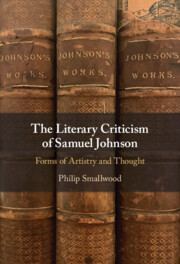Book contents
- The Literary Criticism of Samuel Johnson
- The Literary Criticism of Samuel Johnson
- Copyright page
- Dedication
- Epigraph
- Contents
- Preface
- Acknowledgments
- Abbreviations
- Introduction
- Part I Johnson’s Criticism and the Forms of Feeling
- Part II Critical Relations and the Art of Literary History
- Chapter 3 Petty Caviller or “Formidable Assailant”
- Chapter 4 Readers Curious and Common
- Part III Johnson, Dramatic Poetry and Thinking
- Part IV Time, Truth and History
- Part V Editing Lives, and Life
- Appendix Irony in Revolt: F. R. Leavis Reads Johnson
- Bibliography
- Index
Chapter 3 - Petty Caviller or “Formidable Assailant”
Johnson Reads Dennis
from Part II - Critical Relations and the Art of Literary History
Published online by Cambridge University Press: 07 September 2023
- The Literary Criticism of Samuel Johnson
- The Literary Criticism of Samuel Johnson
- Copyright page
- Dedication
- Epigraph
- Contents
- Preface
- Acknowledgments
- Abbreviations
- Introduction
- Part I Johnson’s Criticism and the Forms of Feeling
- Part II Critical Relations and the Art of Literary History
- Chapter 3 Petty Caviller or “Formidable Assailant”
- Chapter 4 Readers Curious and Common
- Part III Johnson, Dramatic Poetry and Thinking
- Part IV Time, Truth and History
- Part V Editing Lives, and Life
- Appendix Irony in Revolt: F. R. Leavis Reads Johnson
- Bibliography
- Index
Summary
This chapter suggests how Johnson gained from his acquaintance with the criticism of John Dennis. Johnson’s remarks on Shakespeare, Addison and Pope are all shaped by his reflections on the older critic, whose work Johnson quotes more fully than he does any other. Johnson’s response to Dennis is usually to disagree; but there is also respect, and acknowledgment that Dennis had good points to make about Pope’s Essay on Criticism, a poem that was for Johnson a success. Dennis’s reflections on Shakespeare and his complaints that Shakespeare failed to obey decorum trigger Johnson’s most eloquent passages in the Preface. In Johnson’s note to King Lear, where Johnson is lamenting the death of Cordelia, it is to Dennis that Johnson turns when calibrating his own uncertain yet distressed reactions to the play. Similarly, Dennis’s attack on the most celebrated of eighteenth-century tragedies, Addison’s Cato, offered the opportunity for a vivid comparison between a poet of manners and a “poet of nature.” There is truth as well as satire in Johnson’s description of Dennis as a “formidable assailant.” Johnson fulfills an obligation of fairness to his critical past.
- Type
- Chapter
- Information
- The Literary Criticism of Samuel JohnsonForms of Artistry and Thought, pp. 55 - 74Publisher: Cambridge University PressPrint publication year: 2023

